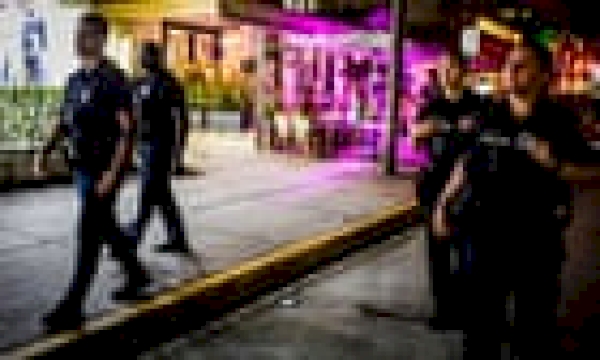There is a different look to spring break in Miami Beach this year, as hordes of students descend from around the country for the annual ritual of sunshine and youthful hedonism.
The palm trees, soft sands and cool blue Atlantic waters that draw tens of thousands to the month-long party are still there. Except now they’re obscured by scores of armed law enforcement officers, many sent at the behest of Florida’s Republican governor, Ron DeSantis.
Unprecedented images of South Beach almost as a military zone, combined with $100 car parking, alcohol bans, bar and beach closures and curfews, are hardly the impression that the usually tourism-friendly Miami Beach would wish to project.
Following successive years of mayhem, in which spring break weekends in the city have been marred by mob violence, including murders, shootings, rapes and robberies, authorities feel they have little choice but to become the party poopers.
“We’re breaking up,” Miami Beach tells students in a light-hearted video, albeit with a serious underlying tone warning of the crackdown, posted to YouTube.
Let Us Build Your Online Success!
We are the experts in creating visually stunning and functional websites. With reliable hosting and exceptional customer support, we bring your vision to life. Join hundreds of happy clients who trust us!
Get Started Now📞 Call/WhatsApp: +256 207 800 192
“We’ve had enough,” was the parallel message from the city’s self-styled law and order mayor, Steven Meiner, as he appeared beside DeSantis at a press conference on Wednesday announcing the deployment of 140 state troopers and other resources to assist local law enforcement in popular Florida spring break cities.
In Miami Beach, where many students arrived early for this weekend’s opening days of spring break month, there is an air of resigned acceptance, mixed with a few grumblings from the business community over the extent of the restrictions.
“Nobody wants the city to look like a military state, it’s not good for our image as a tourism leader,” said Michael Góngora, a former Miami Beach commissioner and mayoral candidate.
“But safety does come first and I think it’s necessary to send the message that we’re really looking to end the spring break party madness that we’ve seen in previous years. It’s my hope we have a more peaceful year.”
Góngora acknowledges many of the problems have been caused not so much by visiting students, but locals.
“Most of the people that come here and are arrested are actually residents of south Florida who aren’t spring breakers but want to be near the party, and unfortunately they’re the ones that bring weapons and drugs and create havoc in the city,” he said.
He also has sympathy with small business owners, such as members of the Ocean Drive Association (ODA) that wrote to the commission concerned about the financial consequences, and some elements of the safety plan, including the removal of public seating along a thoroughfare packed with bars, restaurants and hotels.
“It’s a legitimate concern of the hotels that this may draw the party closer to their properties and create safety issues for their guests, and also that their businesses aren’t taken into consideration in these decisions. March, which used to be a big moneymaker, has now become a bit of a loss for them,” he said.
Ceci Velasco, executive director of the ODA, told the commission her group’s concerns were not about being “less tough”, but ensuring that planning was done right.
“While the conversation at the commission has been focused on control of spring breakers, many of our places of business on Ocean Drive will be filled with high paying guests who must be welcomed, cared for and protracted during their time on South Beach,” she said.
after newsletter promotion
Brittnie Bassant, executive director of the Miami Beach chamber of commerce, said her members also saw security as the top priority, but wanted to have their voices heard in future planning.
“We look forward to working alongside the city over the following months to make sure that we are balancing the best interests of the business as well as the safety of the entire community,” she said.
Other business owners have plans to “distract” future spring breakers by offering alternative entertainment, such as a giant music festival with big-name stars.
“Can you imagine the crowd that would come to see Lady Gaga doing a farewell performance with Elton John on the stage in South Beach?” said David Wallack, owner of Mango’s Tropical Cafe, one of South Beach’s most popular restaurant-nightclubs.
“I totally understand locking it down, but now what do we do? What cultural phenomenon is big enough to displace this whole thing, rent out all the hotel rooms, 22,000 in Miami Beach and all the Airbnbs? You have to have the biggest stars.”
Wallack said he was done with the “bullshit” of spring break street violence, which he said forced him to shield customers with his car during a stampede last year.
He said he was talking with promoters willing to invest millions of dollars to bring an event such as the North Sea Jazz Festival from Curaçao to Florida, which he said would be lucrative for business and allow spring break to be enjoyed safely by those who attended.
“This whole thing going on is a very big experience for all these kids in the street,” he said. “They’re having a party out there, and that’s a cultural phenomenon. Police alone cannot get rid of it.”

